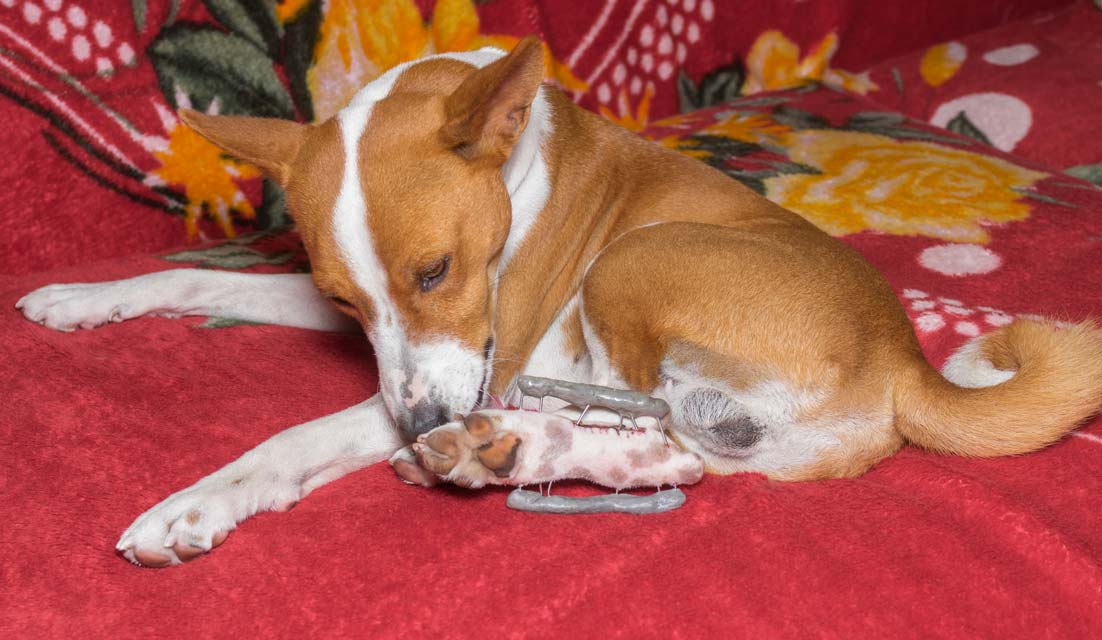
Not only does licking potentially introduce infection but the act of licking can break down tissues and suture. Not only does licking potentially introduce infection but the act of licking can break down tissues and suture.

As dog bites carry risk of infection so does licking.
Is it okay for a dog to lick its wounds. The same applies to wound licking before the rise of modern medicine it was the best tool nature could provide to help your dog heal its wounds. These days cleaning the wound with an antiseptic solution and then leaving it alone to heal is the far superior course of action. How To Stop A Dog Licking Its Wound With Without Use Of A Collar.
Every veterinarian knows that animal patients are driven to lick wounds. We have all seen the destructive force it can be in surgical wound healing. I can recognize a wound that has been licked the instant I see it.
Not only does licking potentially introduce infection but the act of licking can break down tissues and suture. Many people still feel that as a natural response of a dog to a. The practice of allowing dogs to heal wounds with licking dates back as far as the Egyptian age where dogs were allowed to lick the open wounds of humans in the belief that their saliva could heal.
The following compounds are present in canine saliva and are thought to have antimicrobial and healing properties. But when dogs and cats are truly injured allowing them to lick their wounds can do more harm than good. Like most animal activities wound licking has its roots in behavior that would be beneficial under different circumstances.
When a wild animal licks its wounds it is making the. Licking wounds is an instinct that many mammals including dogs have. It is common for animals like cats primates and rodents to lick their injuries.
Sometimes they can even lick the scrapes and cuts of other animal species. This instinct reduces the risk of infection as it helps mammals keep their open wounds. This is especially helpful when it comes to a wound that your dog is tempted to lick but should not be licking because it causes more harm than good.
Pour 2 cups of apple cider vinegar into an empty spray bottle or you can substitute the vinegar with lemon juice Add 1 cup of white vinegar. Although your dog means well when it tries to lick your wounds canine saliva can cause infections in humans. As dog bites carry risk of infection so does licking.
It is rare for dog saliva to cause serious injury but it has in more than one case. Unfortunately licking can reopen the wound and lead to infection. A cone or collar is the traditional way to keep a dog from licking a wound.
You can also try covering the wound with a sleeve or strong bandage. In combination with these techniques engage your dogs attention to keep its mind off the wound as much as possible while it heals. Humans dogs as well as other species will desire to quickly attend to their wounds.
It is an instinct. When your dog licks a wound there are healing capacities in their saliva and it can also help cleanse the area. They are natural healers when it comes to grooming and cleaning.
But excessive licking and biting at a wound is NOT a good thing. And surgical incisions are not the appropriate indication for such ministrations anyway not when there are other better options available. For wild or feral dogs licking is probably beneficial in cleaning a wound.
But wild animals are busy staying safe and finding food whereas a well fed pampered pet can devote a lot of time to licking a wound making it more extensive and sore in the process. So limiting access to wounds particularly surgical ones with stitches is important. A good amount of licking can be helpful for small wounds.
But remember discourage licking after surgery especially if there are stitches involved dogs are likely to bite and pull them out. A case of too much licking causing skin damage. For those reasons its a good idea not to let your dog lick his own wounds and the wounds of other dogs and people especially when it comes to children.
Even if nature is wise and you believe a dog licking himself is an instinct for him to heal himself then that means you can also say that he does it because its the only tool. Dogs lick and groom their wounds to keep them clean prevent infection and relieve pain. Dogs can lick their wounds for up to two weeks before they are required to see a vet.
READ - How to Train a Puppy to Sit When dogs lick their wounds they are searching for a protein called fibrinogen. Dogs will naturally lick any wound on their bodies they can reach with their tongues as its just instinct for them to do so. Because this is such common behavior many people believe that when a dog licks a wound it will promote healing.
Sometimes its fine but other times you need to stop your dog from licking a wound because overlicking can cause more harm than good. Theres a belief that a dogs saliva can help heal wounds. This has some truth to it but unfortunately the healing properties of dog saliva are overblown.
You also can regularly apply ointments and creams on the wound to reduce the dogs desire to scratch. To prevent the dog from licking its injury you can use no-lick spray that makes the wounded area taste unpleasant. Its tongue is full bacteria and the wound is an ideal environment for bacteria to grow.